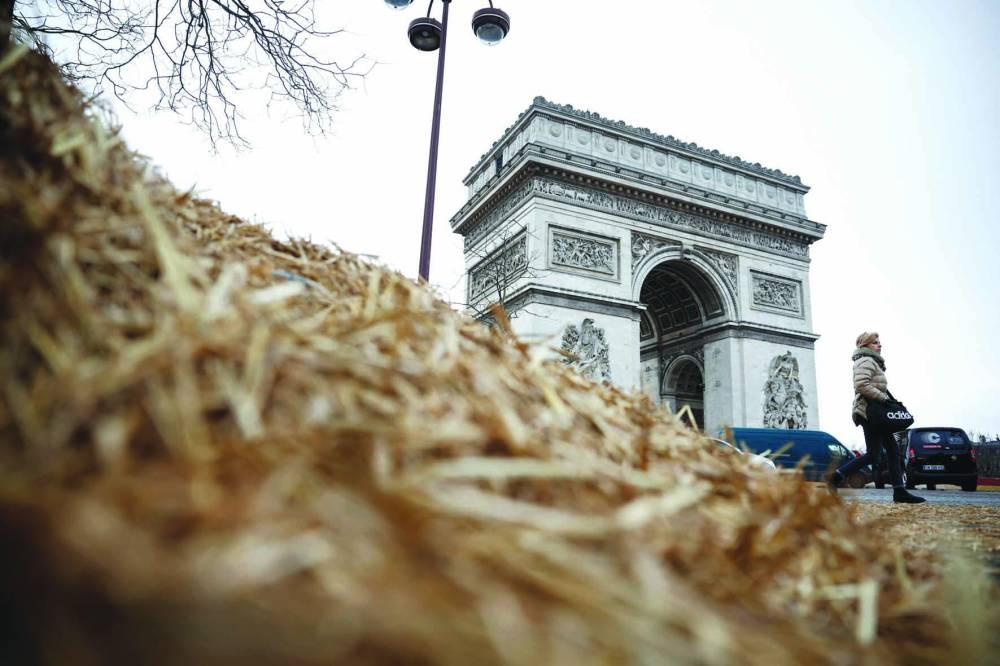France’s leading farming unions have called for an end to nationwide roadblocks over pay, tax and regulation after securing promises of government assistance, adding that it was “time to go home”.
“We say we should transform the action, by telling people they need to go home because there are also people who have jobs to do, there are also people who have been away from home for a very long time,” Arnaud Rousseau, head of the FNSEA union, said.
France has seen some of the angriest of the farmer protests across Europe over the past week.
French farmers opposed an agricultural fuel duty hike, complained about their pay and taxes and were unhappy about European Union regulations.
Rousseau of the biggest rural union FNSEA, and Young Farmers (JA) president Arnaud Gaillot, held a news conference to announce the suspension of the action.
That followed promises of cash, eased regulations and protection against unfair competition by Prime Minister Gabriel Attal, the government’s second wave of concessions in a week.
Rousseau hailed “real progress” and said Attal had been “listening”.
However, the union chief warned that new protests could be held if “initial results” from the promises were not in evidence when France’s main agriculture trade fair opens at the end of this month.
Rousseau reserved harsh criticism for the “deafness” of European level officials, lambasting the “technocratic structure walled into its Brussels offices”.
The FNSEA and JA account for most of French farmers’ union memberships.
Laurence Marandola, spokeswoman for the left-leaning Confederation Paysanne union, said she had “heard nothing” from the government concerning farmers’ incomes and produce prices.
“What we did hear was a big step backwards on environmental questions,” she said.
Attal had earlier said he wanted to “better recognise the farming profession” and “protect” farmers against unfair competition.
He offered measures including an annual €150mn ($162mn) for livestock farmers and a ban on food imports treated with thiacloprid, a neonicotinoid pesticide already banned in France.
The French finance ministry put the total value of the immediate measures at €400mn.
Attal also vowed to ensure a clear Europe-wide definition of lab-grown meat, a technology still in its infancy.
All major supermarkets will be audited for compliance with a law supposed to ensure fair prices for farmers’ produce, Finance Minister Bruno Le Maire added.
France’s national plan for reducing pesticide use “will be put back on the drawing board”, Agriculture Minister Marc Fesneau said, sparking an outcry from environmentalists.
“This will have dramatic consequences for our health and biodiversity,” said Green party deputy Sandrine Rousseau. Fellow deputy Marie-Charlotte Garina observed that farmers “suffer the most from pesticide use”.
A first round of concessions last week included the withdrawal of the fuel tax hike.
Thousands of farmers from across Europe gathered in Brussels on Thursday, where President Emmanuel Macron held talks with European Commission chief Ursula von der Leyen to discuss “the future of European agriculture” before an EU summit there.
After the summit, Macron told reporters that France had managed to persuade the EU to “impose stricter rules” for cereal and poultry imports, including from Ukraine.
The bloc could limit imports of some Ukrainian agricultural products, on which tariffs were dropped following Russia’s 2022 invasion.
While France stood ready to help Ukraine during its war effort, it also disagreed with “unfair competition that will benefit a few billionaires or industrialists who do not respect our rules”, Macron said.
The European Union has in recent days announced a temporary exemption from rules requiring some farmland to be left fallow.
France’s government hailed the moves as a victory for its lobbying, but they were not enough to soothe the farmers’ grievances.
Many remain bitterly opposed to a long-negotiated free-trade deal with South American bloc Mercosur.
Paris has said it will not accept the agreement in its current form, although some other EU nations are determined to press ahead.
A group of 79 farmers was released after being held in custody for a Wednesday incursion into Rungis, a wholesale food hub serving the Paris region.
A convoy of tractors that had travelled more than 700km (440 miles) from the southwestern city of Agen to Rungis hoping to blockade the market was now ready to return home, organisers Co-ordination Rurale said.
Farmers in Germany, Belgium, Poland, Greece, Italy, Romania and the Netherlands have also demanded action by their governments.
In a sign the calls to end the roadblocks were heard, Veronique Le Floc’h of Co-ordination Rurale union said her comrades would now pack their things and go home.
“Now, we are going to take a break,” she said.
It was unclear if the all farmers on France’s streets followed the guidance given by the two main sector labour representatives.
Many farmers are not union members.

Straw lies on a road and pavement near Paris’s Arc de Triomphe on the day of a protest by farmers over price pressures, taxes and green regulation, grievances shared by farmers across Europe.
